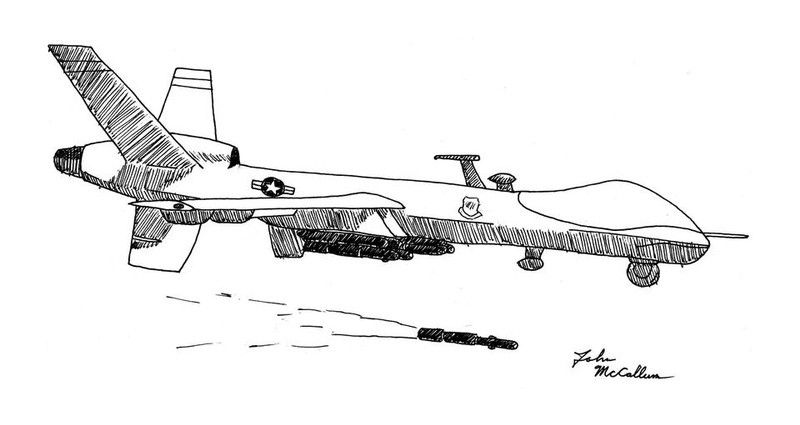This is the third instalment in a series of online-only Roundtables. This new content form from the Crimson Editorial Board seeks to present a diverse array of high-quality student opinion on thought-provoking issues.
If you would like to submit an opinion for this week's Roundtable topic "Should organizations such as the Boy Scouts of America be allowed to exclude a person from membership on the basis of freedom of association?" please e-mail your 200-300 word opinion to hpickerell@college.harvard.edu before Wednesday, Feb. 21 at 6 pm .
More Questions than Answers
Drones and other autonomous weapons systems have provided several strategic benefits to counterterrorism operations. They allow for nearly unlimited reconnaissance with a level of detail that satellites cannot provide and endurance that human intelligence cannot maintain. They also provide an incredibly valuable tool by pursuing enemy combatants without the risk to human life, a fact which may explain their broad public support.
Yet, drones do not yet follow an established operative framework, which has raised several significant questions about their use. One question involves the rule of law, both in terms of their use in non-combat zones abroad and the current lack of executive transparency at home.
Another question concerns the paradox of intelligence gathering. Since drones inherently depend on human intelligence to confirm opportunities and targets, we can only trust them to the extent that we trust the information which legitimates their use. At the same time, drones may actually increase mistrust of the West and fuel anti-American sentiment, which in turn makes intelligence gathering more difficult.
However, there is another, more significant problem. By removing the human beings from the equation, drones may actually cheapen armed conflict to the point that it becomes a primary option rather than a last resort.
The ultimate question raised by drones then is what happens next—could armed conflict become a preferred option to diplomacy? Could a state of war become a permanent aspect of modern life if unit production is the only cost? And, in the short term, could drones unnecessarily prolong a conflict in which there is no strategic definition of victory, such as a war against ideology? Already, some would argue that the answer is yes.
Yes, drones have provided some significant strategic benefits, but we cannot evaluate their worth until we find answers to the questions they raise.
Raul P. Quintana ’14, a Crimson editorial writer, is a social studies concentrator in Leverett House. His column appears on alternate Fridays.
Drones Require Different Moral Approach
The drone strikes employed by the Obama Administration are "necessary" only insofar as they fit into the moral calculus inherent in being the country's Commander-in-Chief. As weapons of mass terror, drones can hold entire Afghani cities hostage to periods of perpetual fear and suffering. However, unlike an American occupation, they require fewer forces on the ground and thus save American lives. The implicit moral calculation a President must make is how many foreign lives are worth one American life.
A common-sense humanitarian—nay, most Americans—would probably argue that the ratio is one to one. However the logic is different for an American president whose political capital fluctuates directly with his approval ratings. Wars are unpopular. Although the drone campaign is a burdensome evil abroad, it is a preferable domestic political strategy because it keeps young Americans in school instead of on the battlefield.
In this sense drones have been necessary in justifying the War on Terror. Abroad, they have also served various military objectives. As they do not require congressional approval to be launched, drones give the executive branch unilateral direction in ordering and carrying out attacks on targets. The military has pushed for an increase in the use of drones instead of ground troops, members of whom have brought public relations stains to the army by burning Korans and publicly urinating on corpses. In relation to boots on the ground, drones are superior to troops for two main reasons: they are more effective and they minimize the risk of American fatalities.
Read more in Opinion
Let Them PlayRecommended Articles
-
Enter the DronePaging Peter Sellers. Suddenly, it seems, a whole lot of people have learned to stop worrying and love the drone.
-
Karthinking About DronesAs more, varied, and better drones become ever more useful substitutes for riskier methods of force projection, diplomacy could lose much of its attractiveness.
-
God Bless DronesThese strikes are not only wiping out threats, but they are also preventing present insurgent forces from organizing themselves effectively.
-
Our Very Own Campaign of TerrorThe US needs to significantly reform its use of drones in the region, if not completely abolish it.
-
Assessing a Legal Framework for Drone StrikesThe U.S. needs to develop an effective balance between efficient systems of eliminating targets and respect for the constitutional rights of terrorists, whatever they may be.














